Product Info Summary
| SKU: | A01253-1 |
|---|---|
| Size: | 100 μg/vial |
| Reactive Species: | Human, Mouse, Rat |
| Host: | Rabbit |
| Application: | ELISA, Flow Cytometry, IF, IHC, ICC, WB |
Customers Who Bought This Also Bought
Product info
Product Name
Anti-Cortactin/CTTN Antibody Picoband™
SKU/Catalog Number
A01253-1
Size
100 μg/vial
Form
Lyophilized
Description
Boster Bio Anti-Cortactin/CTTN Antibody Picoband™ catalog # A01253-1. Tested in ELISA, Flow Cytometry, IF, IHC, ICC, WB applications. This antibody reacts with Human, Mouse, Rat.
Storage & Handling
Store at -20˚C for one year from date of receipt. After reconstitution, at 4˚C for one month. It can also be aliquotted and stored frozen at -20˚C for six months. Avoid repeated freeze-thaw cycles.
Cite This Product
Anti-Cortactin/CTTN Antibody Picoband™ (Boster Biological Technology, Pleasanton CA, USA, Catalog # A01253-1)
Host
Rabbit
Contents
Each vial contains 4mg Trehalose, 0.9mg NaCl, 0.2mg Na2HPO4, 0.05mg NaN3.
Clonality
Polyclonal
Isotype
Rabbit IgG
Immunogen
E. coli-derived human Cortactin recombinant protein (Position: M1-Q105).
*Blocking peptide can be purchased. Costs vary based on immunogen length. Contact us for pricing.
Cross-reactivity
No cross-reactivity with other proteins.
Reactive Species
A01253-1 is reactive to CTTN in Human, Mouse, Rat
Applications
A01253-1 is guaranteed for ELISA, Flow Cytometry, IF, IHC, ICC, WB Boster Guarantee
Observed Molecular Weight
85 kDa
Calculated molecular weight
61.586kDa
Background of Cortactin
Cortactin, mapped to 11q13.3, is a multidomain protein. This gene is overexpressed in breast cancer and squamous cell carcinomas of the head and neck. The encoded protein is localized in the cytoplasm and in areas of the cell-substratum contacts. This gene has two roles: (1) regulating the interactions between components of adherens-type junctions and (2) organizing the cytoskeleton and cell adhesion structures of epithelia and carcinoma cells. During apoptosis, the encoded protein is degraded in a caspase-dependent manner. The aberrant regulation of this gene contributes to tumor cell invasion and metastasis. Three splice variants that encode different isoforms have been identified for this gene.
Antibody Validation
Boster validates all antibodies on WB, IHC, ICC, Immunofluorescence, and ELISA with known positive control and negative samples to ensure specificity and high affinity, including thorough antibody incubations.
Innovating Scientists Reward
If you are the first to review this product, or if you have results for a special sample, species or application this product is not validated in, share your results with us and receive product credits you can use towards any Boster products! Applicable to all scientists worldwide.
Submit A Review
Assay dilution & Images
Reconsitution
Add 0.2ml of distilled water will yield a concentration of 500ug/ml.
Assay Dilutions Recommendation
The recommendations below provide a starting point for assay optimization. The actual working concentration varies and should be decided by the user.
Western blot, 0.1-0.5μg/ml
Immunohistochemistry (Paraffin-embedded Section), 0.5-1μg/ml
Immunohistochemistry (Frozen Section), 0.5-1μg/ml
Immunocytochemistry, 0.5-1μg/ml
Flow Cytometry, 1-3μg/1x106 cells
Immunofluorescence, 2μg/ml
Direct ELISA, 0.1-0.5μg/ml
Validation Images & Assay Conditions
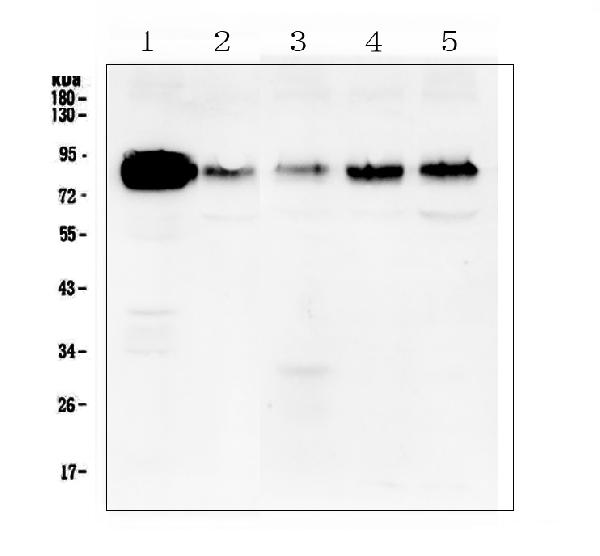
Click image to see more details
Figure 1. Western blot analysis of cortactin using anti-cortactin antibody (A01253-1).
Electrophoresis was performed on a 5-20% SDS-PAGE gel at 70V (Stacking gel) / 90V (Resolving gel) for 2-3 hours. The sample well of each lane was loaded with 50ug of sample under reducing conditions.
Lane 1: human A431 whole cell lysate,
Lane 2: human U-87MG whole cell lysate,
Lane 3: human A549 whole cell lysate,
Lane 4: human PC-3 whole cell lysate,
Lane 5: human Hela whole cell lysate.
After Electrophoresis, proteins were transferred to a Nitrocellulose membrane at 150mA for 50-90 minutes. Blocked the membrane with 5% Non-fat Milk/ TBS for 1.5 hour at RT. The membrane was incubated with rabbit anti-cortactin antigen affinity purified polyclonal antibody (Catalog # A01253-1) at 0.5 μg/mL overnight at 4°C, then washed with TBS-0.1%Tween 3 times with 5 minutes each and probed with a goat anti-rabbit IgG-HRP secondary antibody at a dilution of 1:10000 for 1.5 hour at RT. The signal is developed using an Enhanced Chemiluminescent detection (ECL) kit (Catalog # EK1002) with Tanon 5200 system. A specific band was detected for cortactin at approximately 85KD. The expected band size for cortactin is at 61KD.

Click image to see more details
Figure 10. IHC analysis of cortactin using anti-cortactin antibody (A01253-1).
cortactin was detected in paraffin-embedded section of human oesophagus squama cancer tissue. Heat mediated antigen retrieval was performed in citrate buffer (pH6, epitope retrieval solution) for 20 mins. The tissue section was blocked with 10% goat serum. The tissue section was then incubated with 1μg/ml rabbit anti-cortactin Antibody (A01253-1) overnight at 4°C. Biotinylated goat anti-rabbit IgG was used as secondary antibody and incubated for 30 minutes at 37°C. The tissue section was developed using Strepavidin-Biotin-Complex (SABC)(Catalog # SA1022) with DAB as the chromogen.

Click image to see more details
Figure 2. IHC analysis of cortactin using anti-cortactin antibody (A01253-1).
cortactin was detected in paraffin-embedded section of human cholangiocarcinoma tissue. Heat mediated antigen retrieval was performed in citrate buffer (pH6, epitope retrieval solution) for 20 mins. The tissue section was blocked with 10% goat serum. The tissue section was then incubated with 1μg/ml rabbit anti-cortactin Antibody (A01253-1) overnight at 4°C. Biotinylated goat anti-rabbit IgG was used as secondary antibody and incubated for 30 minutes at 37°C. The tissue section was developed using Strepavidin-Biotin-Complex (SABC)(Catalog # SA1022) with DAB as the chromogen.

Click image to see more details
Figure 20. IHC analysis of cortactin using anti-cortactin antibody (A01253-1).
cortactin was detected in frozen section of human placenta tissues. The tissue section was blocked with 10% goat serum. The tissue section was then incubated with 1μg/ml rabbit anti-cortactin Antibody (A01253-1) overnight at 4°C. Biotinylated goat anti-rabbit IgG was used as secondary antibody and incubated for 30 minutes at 37°C. The tissue section was developed using Strepavidin-Biotin-Complex (SABC)(Catalog # SA1022) with DAB as the chromogen.
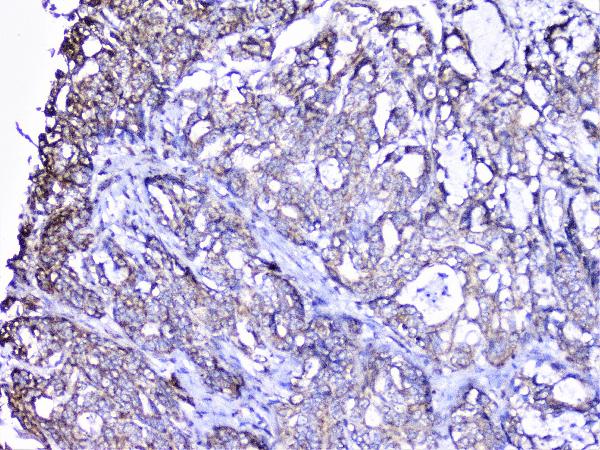
Click image to see more details
Figure 3. IHC analysis of cortactin using anti-cortactin antibody (A01253-1).
cortactin was detected in paraffin-embedded section of human gastric cancer tissue. Heat mediated antigen retrieval was performed in citrate buffer (pH6, epitope retrieval solution) for 20 mins. The tissue section was blocked with 10% goat serum. The tissue section was then incubated with 1μg/ml rabbit anti-cortactin Antibody (A01253-1) overnight at 4°C. Biotinylated goat anti-rabbit IgG was used as secondary antibody and incubated for 30 minutes at 37°C. The tissue section was developed using Strepavidin-Biotin-Complex (SABC)(Catalog # SA1022) with DAB as the chromogen.
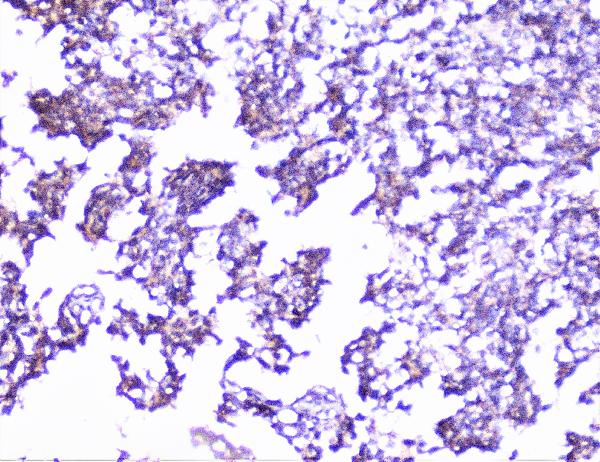
Click image to see more details
Figure 4. IHC analysis of cortactin using anti-cortactin antibody (A01253-1).
cortactin was detected in paraffin-embedded section of human glioma tissue. Heat mediated antigen retrieval was performed in citrate buffer (pH6, epitope retrieval solution) for 20 mins. The tissue section was blocked with 10% goat serum. The tissue section was then incubated with 1μg/ml rabbit anti-cortactin Antibody (A01253-1) overnight at 4°C. Biotinylated goat anti-rabbit IgG was used as secondary antibody and incubated for 30 minutes at 37°C. The tissue section was developed using Strepavidin-Biotin-Complex (SABC)(Catalog # SA1022) with DAB as the chromogen.
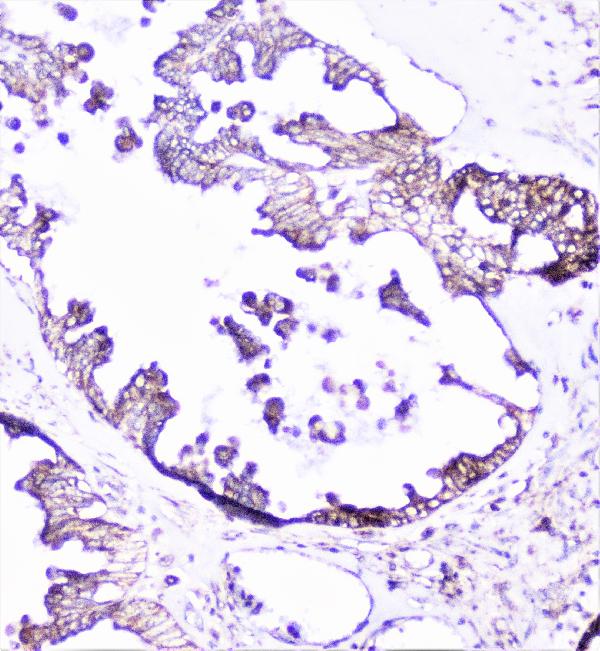
Click image to see more details
Figure 5. IHC analysis of cortactin using anti-cortactin antibody (A01253-1).
cortactin was detected in paraffin-embedded section of human ovary cancer tissue. Heat mediated antigen retrieval was performed in citrate buffer (pH6, epitope retrieval solution) for 20 mins. The tissue section was blocked with 10% goat serum. The tissue section was then incubated with 1μg/ml rabbit anti-cortactin Antibody (A01253-1) overnight at 4°C. Biotinylated goat anti-rabbit IgG was used as secondary antibody and incubated for 30 minutes at 37°C. The tissue section was developed using Strepavidin-Biotin-Complex (SABC)(Catalog # SA1022) with DAB as the chromogen.
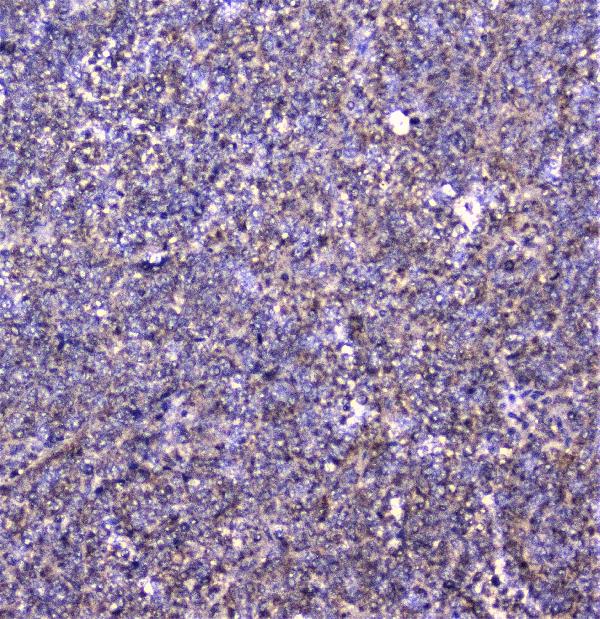
Click image to see more details
Figure 6. IHC analysis of cortactin using anti-cortactin antibody (A01253-1).
cortactin was detected in paraffin-embedded section of human sarcoma tissue. Heat mediated antigen retrieval was performed in citrate buffer (pH6, epitope retrieval solution) for 20 mins. The tissue section was blocked with 10% goat serum. The tissue section was then incubated with 1μg/ml rabbit anti-cortactin Antibody (A01253-1) overnight at 4°C. Biotinylated goat anti-rabbit IgG was used as secondary antibody and incubated for 30 minutes at 37°C. The tissue section was developed using Strepavidin-Biotin-Complex (SABC)(Catalog # SA1022) with DAB as the chromogen.
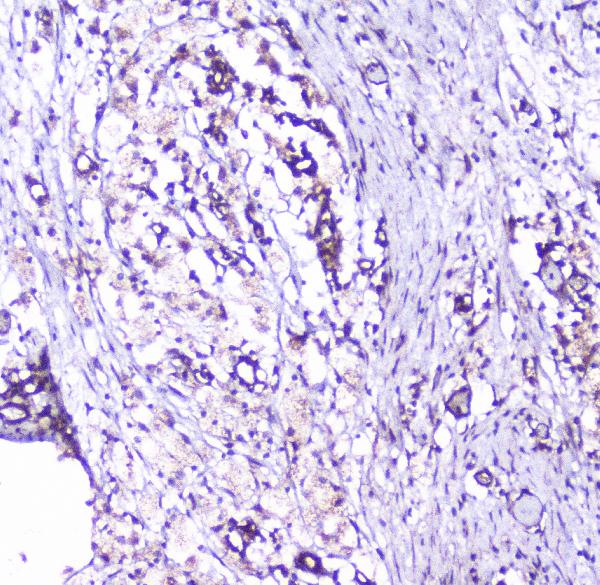
Click image to see more details
Figure 7. IHC analysis of cortactin using anti-cortactin antibody (A01253-1).
cortactin was detected in paraffin-embedded section of human appendicitis tissue. Heat mediated antigen retrieval was performed in citrate buffer (pH6, epitope retrieval solution) for 20 mins. The tissue section was blocked with 10% goat serum. The tissue section was then incubated with 1μg/ml rabbit anti-cortactin Antibody (A01253-1) overnight at 4°C. Biotinylated goat anti-rabbit IgG was used as secondary antibody and incubated for 30 minutes at 37°C. The tissue section was developed using Strepavidin-Biotin-Complex (SABC)(Catalog # SA1022) with DAB as the chromogen.
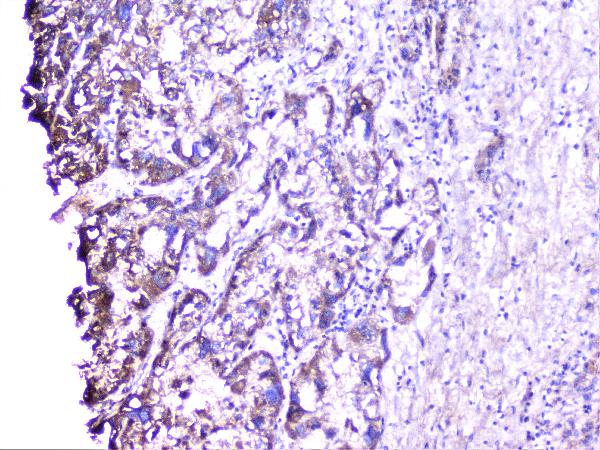
Click image to see more details
Figure 8. IHC analysis of cortactin using anti-cortactin antibody (A01253-1).
cortactin was detected in paraffin-embedded section of human liver cancer tissue. Heat mediated antigen retrieval was performed in citrate buffer (pH6, epitope retrieval solution) for 20 mins. The tissue section was blocked with 10% goat serum. The tissue section was then incubated with 1μg/ml rabbit anti-cortactin Antibody (A01253-1) overnight at 4°C. Biotinylated goat anti-rabbit IgG was used as secondary antibody and incubated for 30 minutes at 37°C. The tissue section was developed using Strepavidin-Biotin-Complex (SABC)(Catalog # SA1022) with DAB as the chromogen.
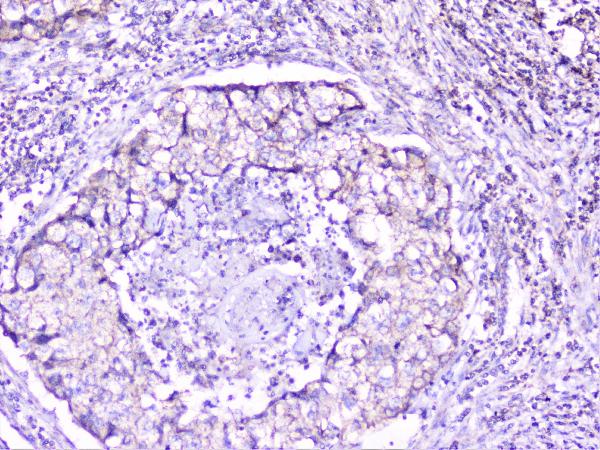
Click image to see more details
Figure 9. IHC analysis of cortactin using anti-cortactin antibody (A01253-1).
cortactin was detected in paraffin-embedded section of human lung cancer tissue. Heat mediated antigen retrieval was performed in citrate buffer (pH6, epitope retrieval solution) for 20 mins. The tissue section was blocked with 10% goat serum. The tissue section was then incubated with 1μg/ml rabbit anti-cortactin Antibody (A01253-1) overnight at 4°C. Biotinylated goat anti-rabbit IgG was used as secondary antibody and incubated for 30 minutes at 37°C. The tissue section was developed using Strepavidin-Biotin-Complex (SABC)(Catalog # SA1022) with DAB as the chromogen.

Click image to see more details
Figure 11. IHC analysis of cortactin using anti-cortactin antibody (A01253-1).
cortactin was detected in paraffin-embedded section of human placenta tissue. Heat mediated antigen retrieval was performed in citrate buffer (pH6, epitope retrieval solution) for 20 mins. The tissue section was blocked with 10% goat serum. The tissue section was then incubated with 1μg/ml rabbit anti-cortactin Antibody (A01253-1) overnight at 4°C. Biotinylated goat anti-rabbit IgG was used as secondary antibody and incubated for 30 minutes at 37°C. The tissue section was developed using Strepavidin-Biotin-Complex (SABC)(Catalog # SA1022) with DAB as the chromogen.

Click image to see more details
Figure 12. IHC analysis of cortactin using anti-cortactin antibody (A01253-1).
cortactin was detected in paraffin-embedded section of human rectal cancer tissue. Heat mediated antigen retrieval was performed in citrate buffer (pH6, epitope retrieval solution) for 20 mins. The tissue section was blocked with 10% goat serum. The tissue section was then incubated with 1μg/ml rabbit anti-cortactin Antibody (A01253-1) overnight at 4°C. Biotinylated goat anti-rabbit IgG was used as secondary antibody and incubated for 30 minutes at 37°C. The tissue section was developed using Strepavidin-Biotin-Complex (SABC)(Catalog # SA1022) with DAB as the chromogen.

Click image to see more details
Figure 13. IHC analysis of cortactin using anti-cortactin antibody (A01253-1).
cortactin was detected in paraffin-embedded section of mouse intestine tissue. Heat mediated antigen retrieval was performed in citrate buffer (pH6, epitope retrieval solution) for 20 mins. The tissue section was blocked with 10% goat serum. The tissue section was then incubated with 1μg/ml rabbit anti-cortactin Antibody (A01253-1) overnight at 4°C. Biotinylated goat anti-rabbit IgG was used as secondary antibody and incubated for 30 minutes at 37°C. The tissue section was developed using Strepavidin-Biotin-Complex (SABC)(Catalog # SA1022) with DAB as the chromogen.

Click image to see more details
Figure 14. IHC analysis of cortactin using anti-cortactin antibody (A01253-1).
cortactin was detected in paraffin-embedded section of mouse spleen tissue. Heat mediated antigen retrieval was performed in citrate buffer (pH6, epitope retrieval solution) for 20 mins. The tissue section was blocked with 10% goat serum. The tissue section was then incubated with 1μg/ml rabbit anti-cortactin Antibody (A01253-1) overnight at 4°C. Biotinylated goat anti-rabbit IgG was used as secondary antibody and incubated for 30 minutes at 37°C. The tissue section was developed using Strepavidin-Biotin-Complex (SABC)(Catalog # SA1022) with DAB as the chromogen.

Click image to see more details
Figure 15. IHC analysis of cortactin using anti-cortactin antibody (A01253-1).
cortactin was detected in paraffin-embedded section of rat brain tissue. Heat mediated antigen retrieval was performed in citrate buffer (pH6, epitope retrieval solution) for 20 mins. The tissue section was blocked with 10% goat serum. The tissue section was then incubated with 1μg/ml rabbit anti-cortactin Antibody (A01253-1) overnight at 4°C. Biotinylated goat anti-rabbit IgG was used as secondary antibody and incubated for 30 minutes at 37°C. The tissue section was developed using Strepavidin-Biotin-Complex (SABC)(Catalog # SA1022) with DAB as the chromogen.

Click image to see more details
Figure 16. IHC analysis of cortactin using anti-cortactin antibody (A01253-1).
cortactin was detected in paraffin-embedded section of rat intestine tissue. Heat mediated antigen retrieval was performed in citrate buffer (pH6, epitope retrieval solution) for 20 mins. The tissue section was blocked with 10% goat serum. The tissue section was then incubated with 1μg/ml rabbit anti-cortactin Antibody (A01253-1) overnight at 4°C. Biotinylated goat anti-rabbit IgG was used as secondary antibody and incubated for 30 minutes at 37°C. The tissue section was developed using Strepavidin-Biotin-Complex (SABC)(Catalog # SA1022) with DAB as the chromogen.

Click image to see more details
Figure 17. IHC analysis of cortactin using anti-cortactin antibody (A01253-1).
cortactin was detected in paraffin-embedded section of rat spleen tissue. Heat mediated antigen retrieval was performed in citrate buffer (pH6, epitope retrieval solution) for 20 mins. The tissue section was blocked with 10% goat serum. The tissue section was then incubated with 1μg/ml rabbit anti-cortactin Antibody (A01253-1) overnight at 4°C. Biotinylated goat anti-rabbit IgG was used as secondary antibody and incubated for 30 minutes at 37°C. The tissue section was developed using Strepavidin-Biotin-Complex (SABC)(Catalog # SA1022) with DAB as the chromogen.
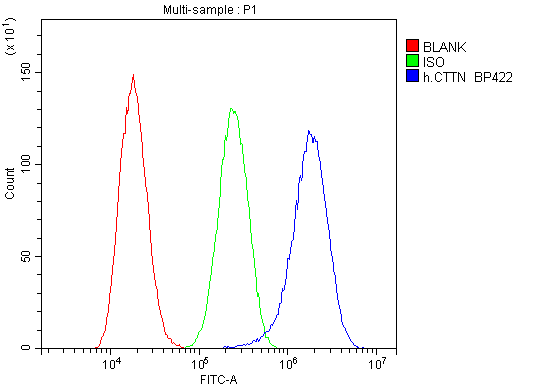
Click image to see more details
Figure 18. Flow Cytometry analysis of A549 cells using anti-cortactin antibody (A01253-1).
Overlay histogram showing A549 cells stained with A01253-1 (Blue line).The cells were blocked with 10% normal goat serum. And then incubated with rabbit anti-cortactin Antibody (A01253-1,1μg/1x106 cells) for 30 min at 20°C. DyLight®488 conjugated goat anti-rabbit IgG (BA1127, 5-10μg/1x106 cells) was used as secondary antibody for 30 minutes at 20°C. Isotype control antibody (Green line) was rabbit IgG (1μg/1x106) used under the same conditions. Unlabelled sample (Red line) was also used as a control.

Click image to see more details
Figure 19. IF analysis of cortactin using anti-cortactin antibody (A01253-1).
cortactin was detected in paraffin-embedded section of A431 cell. Enzyme antigen retrieval was performed using IHC enzyme antigen retrieval reagent (AR0022) for 15 mins. The tissue section was blocked with 10% goat serum. The tissue section was then incubated with 2μg/mL rabbit anti-cortactin Antibody (A01253-1) overnight at 4°C. DyLight®488 Conjugated Goat Anti-Rabbit IgG (BA1127) was used as secondary antibody at 1:100 dilution and incubated for 30 minutes at 37°C. The section was counterstained with DAPI. Visualize using a fluorescence microscope and filter sets appropriate for the label used.
Protein Target Info & Infographic
Gene/Protein Information For CTTN (Source: Uniprot.org, NCBI)
Gene Name
CTTN
Full Name
Src substrate cortactin
Weight
61.586kDa
Alternative Names
1110020L01Rik; Amplaxin; Cortactin; CTTN; ems1 sequence (mammary tumor and squamous cell carcinoma-associated (p80/85 srcsubstrate); EMS1; EMS1amplaxin; FLJ34459; Oncogene EMS1; src substrate cortactin CTTN EMS1 cortactin src substrate cortactin|1110020L01Rik|amplaxin|ems1 sequence (mammary tumor and squamous cell carcinoma-associated (p80/85 src substrate)|epididymis secretory sperm binding protein|oncogene EMS1
*If product is indicated to react with multiple species, protein info is based on the gene entry specified above in "Species".For more info on CTTN, check out the CTTN Infographic

We have 30,000+ of these available, one for each gene! Check them out.
In this infographic, you will see the following information for CTTN: database IDs, superfamily, protein function, synonyms, molecular weight, chromosomal locations, tissues of expression, subcellular locations, post-translational modifications, and related diseases, research areas & pathways. If you want to see more information included, or would like to contribute to it and be acknowledged, please contact [email protected].
Specific Publications For Anti-Cortactin/CTTN Antibody Picoband™ (A01253-1)
Hello CJ!
No publications found for A01253-1
*Do you have publications using this product? Share with us and receive a reward. Ask us for more details.
Recommended Resources
Here are featured tools and databases that you might find useful.
- Boster's Pathways Library
- Protein Databases
- Bioscience Research Protocol Resources
- Data Processing & Analysis Software
- Photo Editing Software
- Scientific Literature Resources
- Research Paper Management Tools
- Molecular Biology Software
- Primer Design Tools
- Bioinformatics Tools
- Phylogenetic Tree Analysis
Customer Reviews
Have you used Anti-Cortactin/CTTN Antibody Picoband™?
Submit a review and receive an Amazon gift card.
- $30 for a review with an image
Be the first to review Anti-Cortactin/CTTN Antibody Picoband™
*The first user to submit a review for a product is eligible for Boster's Innovating Scientists Reward, which gives product credits. This is in addition to the gift card reward.
Customer Q&As
Have a question?
Find answers in Q&As, reviews.
Can't find your answer?
Submit your question
5 Customer Q&As for Anti-Cortactin/CTTN Antibody Picoband™
Question
My team were satisfied with the WB result of your anti-Cortactin/CTTN antibody. However we have observed positive staining in leukemic t-cell cytoplasm using this antibody. Is that expected? Could you tell me where is CTTN supposed to be expressed?
Verified Customer
Verified customer
Asked: 2019-12-04
Answer
According to literature, leukemic t-cell does express CTTN. Generally CTTN expresses in cytoplasm, cytoskeleton. Regarding which tissues have CTTN expression, here are a few articles citing expression in various tissues:
Cervix carcinoma, Pubmed ID: 16964243, 17081983, 18220336, 18669648, 18691976, 20068231
Cervix carcinoma, and Erythroleukemia, Pubmed ID: 23186163
Leukemic T-cell, Pubmed ID: 15144186, 19690332
Liver, Pubmed ID: 24275569
Mammary gland, Pubmed ID: 1532244, 8474448
Placenta, and Testis, Pubmed ID: 15489334
Platelet, Pubmed ID: 18088087
Prostate cancer, Pubmed ID: 17487921
Boster Scientific Support
Answered: 2019-12-04
Question
We are currently using anti-Cortactin/CTTN antibody A01253-1 for human tissue, and we are happy with the Flow Cytometry results. The species of reactivity given in the datasheet says human, mouse, rat. Is it true that the antibody can work on feline tissues as well?
Verified Customer
Verified customer
Asked: 2019-07-25
Answer
The anti-Cortactin/CTTN antibody (A01253-1) has not been tested for cross reactivity specifically with feline tissues, but there is a good chance of cross reactivity. We have an innovator award program that if you test this antibody and show it works in feline you can get your next antibody for free. Please contact me if I can help you with anything.
Boster Scientific Support
Answered: 2019-07-25
Question
We ordered your anti-Cortactin/CTTN antibody for IF on cervix carcinoma in a previous experiment. I am using mouse, and We intend to use the antibody for Flow Cytometry next. We want examining cervix carcinoma as well as platelet in our next experiment. Do you have any suggestion on which antibody would work the best for Flow Cytometry?
Verified Customer
Verified customer
Asked: 2019-06-04
Answer
I looked at the website and datasheets of our anti-Cortactin/CTTN antibody and it seems that A01253-1 has been tested on mouse in both IF and Flow Cytometry. Thus A01253-1 should work for your application. Our Boster satisfaction guarantee will cover this product for Flow Cytometry in mouse even if the specific tissue type has not been validated. We do have a comprehensive range of products for Flow Cytometry detection and you can check out our website bosterbio.com to find out more information about them.
Boster Scientific Support
Answered: 2019-06-04
Question
We are interested in using your anti-Cortactin/CTTN antibody for positive regulation of actin filament polymerization studies. Has this antibody been tested with western blotting on gastric cancer tissue? We would like to see some validation images before ordering.
Verified Customer
Verified customer
Asked: 2018-10-18
Answer
Thanks for your inquiry. This A01253-1 anti-Cortactin/CTTN antibody is validated on human sarcoma tissue, a431 whole cell lysate, a549 whole cell lysate, hela whole cell lysate, appendicitis tissue, cholangiocarcinoma tissue, gastric cancer tissue, glioma tissue, ovary cancer tissue, liver cancer tissue, lung cancer tissue, squama cancer tissue, placenta tissue, rectal cancer tissue, mouse spleen tissue, intestine tissue, rat brain tissue. It is guaranteed to work for ELISA, Flow Cytometry, IF, IHC, ICC, WB in human, mouse, rat. Our Boster guarantee will cover your intended experiment even if the sample type has not been be directly tested.
Boster Scientific Support
Answered: 2018-10-18
Question
We have seen staining in human cervix carcinoma erythroleukemia. Are there any suggestions? Is anti-Cortactin/CTTN antibody supposed to stain cervix carcinoma erythroleukemia positively?
M. Patel
Verified customer
Asked: 2016-06-30
Answer
According to literature cervix carcinoma erythroleukemia does express CTTN. According to Uniprot.org, CTTN is expressed in right ovary, mammary gland, placenta testis, leukemic t-cell, cervix carcinoma, prostate cancer, platelet, cervix carcinoma erythroleukemia, liver, among other tissues. Regarding which tissues have CTTN expression, here are a few articles citing expression in various tissues:
Cervix carcinoma, Pubmed ID: 16964243, 17081983, 18220336, 18669648, 18691976, 20068231
Cervix carcinoma, and Erythroleukemia, Pubmed ID: 23186163
Leukemic T-cell, Pubmed ID: 15144186, 19690332
Liver, Pubmed ID: 24275569
Mammary gland, Pubmed ID: 1532244, 8474448
Placenta, and Testis, Pubmed ID: 15489334
Platelet, Pubmed ID: 18088087
Prostate cancer, Pubmed ID: 17487921
Boster Scientific Support
Answered: 2016-06-30





